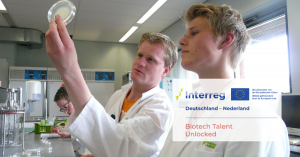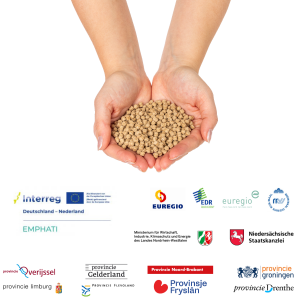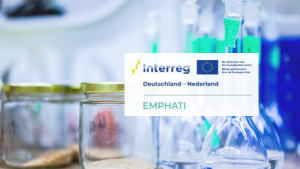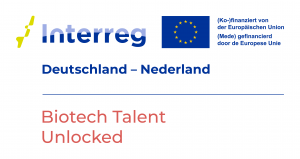
Good news for the biobased ecosystem in Northern Netherlands. The Biotech Talent Unlocked project received a grant of €558,000 from Interreg VI A on Thursday, December 8. Interreg is a European funding program for spatial and regional development. The Biotech Talent Unlocked project aims to organize sufficient appropriately skilled talent for the circular and biobased economy in the Ems Dollart Region (EDR).
Project Goal
With the Biotech Talent Unlocked project, educational institutions and companies want to actively organize sufficient and suitably skilled talent for the circular and biobased economy. Companies on both sides of the border experience significant difficulties in finding and retaining adequately trained staff at MBO, bachelor, and master levels in biotechnical and related fields. To prevent these companies from suffering negative impacts on their innovation capacity, a decline in general business activity in the EDR region, and jeopardizing the transition to a green economy in the northern border region, the BIO Cooperative and partners are joining forces to address this cross-border human capital challenge.
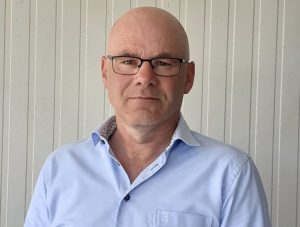 Cor Kamminga, Chairman of the BIO Cooperative: “Jobs are truly abundant in the circular and biobased economy in the EDR region. However, talent often struggles to find these companies. This is partly due to competition with other regions like the Randstad, but also due to visibility issues. With this project, we aim to ensure that young talent from Germany and the Netherlands clearly understands the career opportunities available here. We also want to lower barriers by aligning education more closely with the jobs offered by companies in this region. The qualifications young people achieve should easily enable them to work on the other side of the border as well.”
Cor Kamminga, Chairman of the BIO Cooperative: “Jobs are truly abundant in the circular and biobased economy in the EDR region. However, talent often struggles to find these companies. This is partly due to competition with other regions like the Randstad, but also due to visibility issues. With this project, we aim to ensure that young talent from Germany and the Netherlands clearly understands the career opportunities available here. We also want to lower barriers by aligning education more closely with the jobs offered by companies in this region. The qualifications young people achieve should easily enable them to work on the other side of the border as well.”
Setting a Good Example
The project partners include BIO Cooperative, Hochschule Emden-Leer, BBENG, Hanzehogeschool Groningen, 3N Kompetenzzentrum e.V., Rijksuniversiteit Groningen, NHL Stenden Leeuwarden, Noorderpoort College, Friesland College, and Drenthe College. Sven Stielstra, business developer at the BIO Cooperative: “With these partners, we form the initial group of this consortium. The intention is to add more partners as the project progresses. We want to set a good example in the region and gradually involve more partners to jointly tackle this significant human capital challenge.” Following the Interreg grant award, the project will start in the first quarter of 2023. The funding will continue until the year 2025.
Building Bridges
To avoid losing the ‘war on talent’, it is essential to actively seek collaboration with educational institutions. This project will connect the business community with knowledge institutions and develop substantive cooperation opportunities. Additionally, concrete educational modules for cross-border participation will be developed, and new joint educational modules will be set up to create impactful, cross-border educational activities that seamlessly align with the job market. Janneke Krooneman, professor at the Hanzehogeschool Groningen: “Currently, some collaboration with companies is already taking place, but often from an individual institution’s perspective. This limits students’ understanding of what is possible and where opportunities lie in their region. With this project, we aim to build those bridges and provide a complete picture to young people. We also want to pool our strengths: together we achieve more.”
Getting on the Radar
During the project, there will also be a focus on communication and joint events to achieve the objectives. This includes events such as project presentations, company visits, partner events where interested new project partners (companies and knowledge institutions) can join and learn about the project. Mark Rüsch gen. Klaas, Professor at Hochschule Emden-Leer: “To present the region and its opportunities effectively to the target audience, we will strongly focus on social media, in addition to messages in regional newspapers and on the websites of participating partners. We want to ensure that we are on the radar of all German and Dutch talent as a promising region for exciting jobs in biotechnology and the green economy. And that means we need to be present where we can reach our target audience, including online.”
About the BIO Cooperative
The BIO Cooperative is an independent collaboration of SMEs working in the bio-economy in Northern Netherlands. Founded in 2016, the cooperative represents 17 members. Its goal is knowledge sharing, cost reduction, and revenue increase for its members. Together with its members, the BIO Cooperative aims to embed substantive issues related to the bio-economy regionally and ensure economic impact and job creation.

